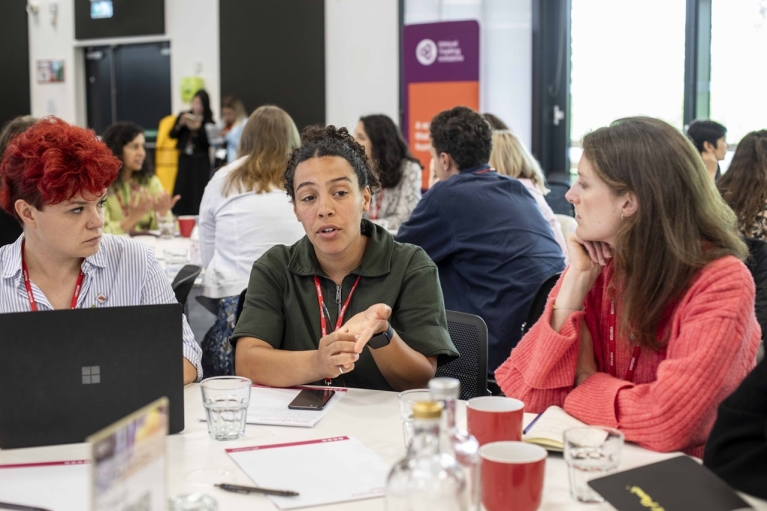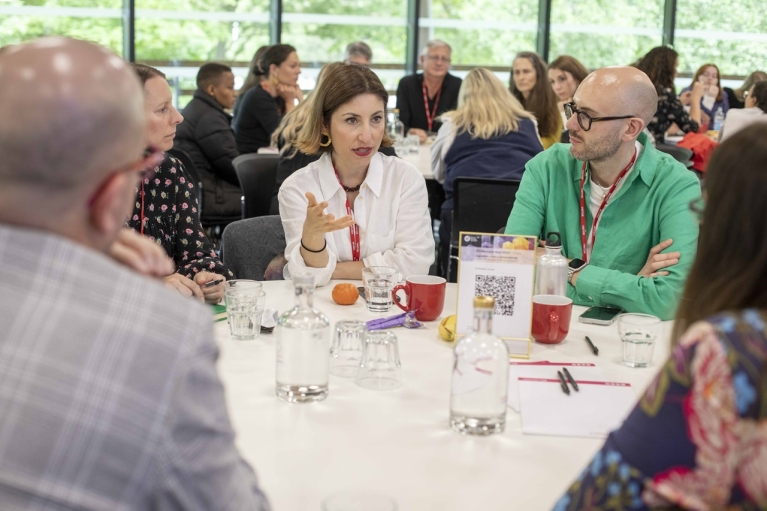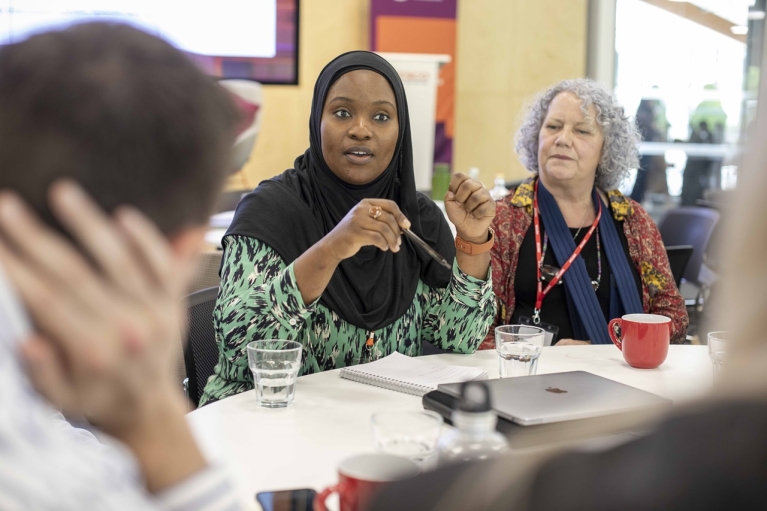
Every year, we host our entire membership for an exclusive event where over 200 members, staff, and outside experts come together in-person, to share insights, build connections, and collaborate. Every ‘ETI Member Day’ focuses on a selection of live topics, where collaboration is critical to advance human rights in global supply chains.
This year’s event focused on ‘Legislation, crisis, climate change: Tackling the big issues together’ and featured keynote addresses from our Executive Directors – incoming Giles Bolton, and departing Peter McAllister – our Board Chair Mary Creagh, Head of Sustainability at Tesco, Kené Umeasiegbu and Shadow Minister for Trade, Gareth Thomas MP. Each of the ‘big issues’ was addressed in plenary, with panel discussions, presentations, and opportunities for Q&A with experienced staff, members and outside experts. As always, there was plenty of room for networking over lunch, as well as the opportunity to join facilitated table discussions on topics chosen by members ahead of the day. Check out the full agenda.
What were the biggest takeaways from the day’s sessions?
Session 1: Making the most of mHRDD: Opportunities and risks
Acknowledging the opportunity mandatory human rights due diligence presents companies, to enhance their visibility and leverage it to their advantage, this session explored how business can take a collective and proactive approach to move beyond mere human rights and environmental compliance. Key discussion takeaways included:
- International frameworks and guidelines, such as the OECD and UNGPs, are critical to developing understanding and commitment to human rights practices, and adapting to new regulations.
- Efforts must go beyond risk mapping. Approaches to risk assessment should be refined to better target and address salient human rights risks.
- Engaging with local stakeholders is important and valuable. From workers and their representatives to local communities and NGOs, meaningful engagement can build long-term trust, understanding and partnerships, and facilitate social dialogue, particularly in contexts where freedom of association is restricted.
- Meaningful engagement, stakeholder collaboration and human rights resource allocation are essential to understand and meet needs, address and mitigate risks, and implement effective human rights practices.
Session 2: How to respond in a crisis: Practical tools and guidance
Businesses are operating in increasingly volatile, uncertain and unpredictable environments. Meaningful stakeholder engagement, increased supply chain intelligence, risk assessment, transparency and response planning can help to avoid specific crises, or higher risk sourcing areas where possible, but also react effectively when crises inevitably occur. This session featured live demonstrations of a suite of free practical tools and innovative resources that business can use to assess and mitigate exposure to crisis-related supply chain risks. Key resources included:
CSR Risk Check
The CSR Risk Check is a risk analysis tool developed by MVO Nederland aimed at companies with complex global supply chains. The tool includes both quantitative and qualitative data on more than 6000 risks from over 3500 online sources. It can help businesses to conduct due diligence by providing searchable access to information on human rights, conflict, and political risks along with suggested organisations and advice tailored to specific country, product or risks-based needs.
Open Supply Hub makes supply chain data open, accessible and trusted for the public benefit. OSH provides a single, consistent reference point that enables stakeholders to collectively address challenges and drive progress for human rights and the environment. The OSH platform can provide practical help in a crisis, enabling companies to map affected areas, identify overlapping suppliers and highlight opportunities to engage in collaborative solutions to crisis response.
HRDD in challenging contexts: Practical examples & resources for companies
Developed by the Joint Ethical Trading Initiatives, based in Denmark, Norway, Sweden and the UK, this new report provides practical examples of how companies operating in or sourcing from challenging contexts are managing human rights risks, in line with the UNGPs and the OECD guidelines. Register to attend the launch webinar in June.
Explore presentation slides from this session.
Session 3: What does the climate crisis mean for workers’ rights?
The climate crisis is impacting workers worldwide, from those picking fruit in temperatures close to 50 degrees in Southern Italy, to others in Bangladesh facing increasingly frequent and extensive flood events. This session examined what this means from a human rights lens, how business should mitigate impacts on workers’ rights within a just transition, and the role social dialogue can play in these efforts. Key takeaways included:
- Climate impacts on workers’ rights are increasingly apparent. In Bangladesh, illnesses caused by heat or disease due to floods can see workers averaging three sick days a month.
- ETI members have seen climate affect all aspects of the ETI Base Code, both directly and indirectly.
- Collaboration remains key to leverage urgent change and drive progress both internally and externally. Combining environment and human rights resources, teams and understanding can support the implementation of just transitions principles at buyer-level. Building and leveraging supply chain relationships and facilitating social dialogue with workers and their representatives, can develop greater insight and progress along the value chain.
- Just Transition should be considered a principle, a process, a policy, and a practice. We tackled the pandemic by working together and can apply the same techniques and urgency to the climate crisis.
Explore presentation slides from this session.
Discussion tables
To facilitate even greater opportunity for engagement across our tripartite membership this year’s event hosted discussion tables, led by the secretariat and our NGO and trade union members. Participants could join a table of their choice to ask discussion leads questions and join in lively conversations on key topics.
NGO member engagement
Sabita Banerji – ETI NGO Coordinator/ CEO/Founder, THIRST
Keren Pybus – CEO, Global Apparel Training Association, GATA
Trade union member engagement
Stephen Craig – ETI Trade Union Coordinator/Unite the Union
Tackling gender-based violence and harassment (GBVH)
Halima Ahmed – Senior Advisor Gender, ETI
Caroline Downey – Executive Director, Women Working Worldwide on
Mark Robertson – Senior Vice President, The Centre for Child Rights and Business
HRIAs (Human Rights Impacts Assessments)
Rachel Wilshaw – Workers' Rights Senior Manager, Oxfam
Collaborative sourcing and risk ownership
Anna Mann – Associate Director, Fairtrade Foundation
Enabling FOA and worker representation
Stephen Russell – ETI Board/Senior International Officer, Trade Union Congress (TUC)



Thank you to all who made ETI Member Day 2024 a success. We look forward to seeing you next year.
